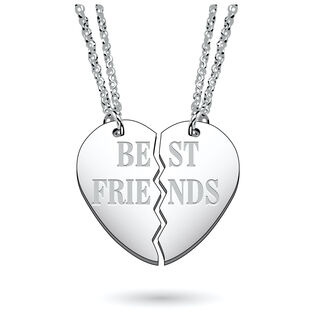Friends
4 Reasons for Lost Friendships
... and how to grow from anger and sadness to gratitude.
Posted March 30, 2021 Reviewed by Ekua Hagan
Key points
- Friendships can be lost due to disagreements, lifestyle differences, emotional or personality patterns or inattention.
- Saving a friendship can mean reaching out, apologizing, collaborating on a resolution or agreeing to changes in the relationship.
- Even if a friend is gone forever, there is one thing you can do: Choose how you view the lost friendship.
- Gratitude for what you shared and learned from the friendship rather than looking back with bitterness can make even a lost friendship a blessing in your life.

The pain in my client’s text message was palpable: “My best friend told me I was toxic and she wants nothing to do with me! This is the worst thing to happen in the worst year of my life!”
I took a deep breath. This was serious. Tracy had been best friends with Jen for 23 years — since their freshman year of college. Even though they lived in different states and had quite different lives, they talked on the phone daily, sometimes several times a day. Jen was Tracy’s main source of support in her life.
What could have gone so terribly wrong?
When we met for our next session, I got a clue: Angry over yet another romantic disappointment, Tracy had called her friend to complain that the universe was conspiring to make her miserable and keep her lonely. Jen tried to reassure her, And Tracy turned her anger onto Jen, yelling about the times Jen had let her down by not agreeing to some unrealistic demands in the past. Exasperated and defensive, Jen had told her that she was toxic and that she couldn’t be her friend anymore.
A Closer Look at Why We Lose Friendships
We’ve all lost friendships — often less dramatically — for a variety of reasons:
Hurtful patterns that become intolerable over time
Perhaps you’ve had a friend like Tracy who calls multiple times a day when you’re at work or trying to get the baby down for a nap and is angry that you can’t drop everything to listen to her. Or perhaps a friend has a habit of making jokes or barbed comments at your expense — which was tolerable when you were younger, but less so now. Or maybe a friend expects you to listen intently to the latest drama of her life at any hour of the day or night — but never bothers to ask how you’re doing.
“I began to realize, after nearly 10 years of friendship with Lucy that our relationship was really out of balance,” my client Megan told me not long ago. “I always tried to be there for her in happy times and troubled times, but she was rarely there for me when I needed her. As I’ve begun to feel better about myself, I feel I deserve more. I want equality in friendship. That wasn’t happening with Lucy. I told her how I felt. She just couldn’t see how one-sided things had become. So I started to pull away. I haven’t answered her phone calls and take my time to answer texts. We haven’t seen each other for several months. It's sad, but it feels necessary to me."
Differing opinions and world views — political or otherwise
The present political divide has been hard on all relationships — friends among them. Some people who managed to weather differing political affiliations have found themselves estranged over differing views of COVID-19 and safety measures — masking or not masking, getting vaccinated or not. At a time of painfully heightened awareness of racial hatreds and discrimination, differing views and life experiences can cause friendships to falter and fade.
“I’ve been friends with Jon for four years since we worked together at an internship during college,” my client Claire, who is Asian-American, told me the other day. “But he’s so willfully oblivious to the racism that people of color face every day — even those of us in supposedly ‘model minority’ communities. He told me I have a good life and nothing to complain about. I don’t think I want to bother to share my own vulnerabilities with him — the many times I’ve been hurt — or my concerns for others who are not as fortunate as I have been and whose lives have been adversely affected, even shattered, by racism. He scoffs at the concept of white male privilege. Seriously? We can’t have a rational conversation and, frankly, I don’t want to try anymore.”
Behavior rooted in life experiences or psychological disorders
Those with borderline personality disorder typically have unstable friendships — exploding with anger over issues that seem small to others, cutting friends out of their lives at the first sign of conflict or disagreement, describing a new acquaintance as “my new best friend.” And there are many people who don't have the disorder but who, nonetheless, may find friendships slipping away on a regular basis.
“I’m prone to that, sad to say,” my friend Ben told me. “I think it comes from when I was a kid. We moved all the time. I was always the new kid in school. Sometimes I was picked on, sometimes ignored. And I’d often find myself rejecting other people or simply letting friendships or the possibility of a friendship slip away because I have always been so afraid of being abandoned by someone I cared about. Better to walk away first. Needless to say, it isn’t something that has made me happy all these years."
Your roads diverge in life
Friendships may be easy in school and young adulthood but can face challenges when roads diverge: one friend marries and has small children, the other is single and is career-oriented; job transfers, a romantic partner your best friend finds unworthy of you, or simple inattention due to the busyness of lives unfolding can cause friends to drift apart. The daily calls or texts may, in time, dwindle into brief Christmas card notes… or gradual silence.
The growing distance between you and a friend can be painful, even when there is no drama or obvious disagreement.
What to do when a friend is becoming a stranger
If you want to try to save the friendship, it’s time to talk. This may mean reaching out first, apologizing first for your part in the relationship not working, and expressing your desire to resolve your differences.
It may mean showing that you care in other ways: sending your friend a card to let him or her know you miss the companionship you once shared or remembering a birthday or special anniversary. Or sending an exploratory text or making a phone call that could make all the difference.
Friendship rescue might also mean changing the nature of the friendship. Maybe you don’t do well together as close friends but could manage a more casual friendship quite well. I have a dear long-distance friend I can’t bear to talk with on the phone anymore — our communication styles are too jarringly different — but we connect well in writing and texting. I can’t imagine her not being in my life, but, at least for now, I need more distance than we used to have. In the interest of maintaining our connection, she has agreed to the limitations.
There are times, though, when there is nothing to be done to save a once warm friendship as it fades into history.
There is, however, one thing you can do. You have a choice about how to remember the lost friendship and how you will react to the loss. You can be angry and bitter. Or you can look at what you have learned from both the friendship and its demise. And, perhaps in time, you can come to see it through the lens of gratitude.
That’s how another client — 19-year-old Luisa, a college sophomore — regards her lost friendship with Troy. “We had been friends since junior year of high school and we enjoyed so many good times together," she recalled. "Our friendship was a great experience for me in discovering how being friends with a guy is not only possible but wonderful! I was always shy around guys until I got to know Troy. Then, toward the end of our senior year, he had this girlfriend who didn’t understand that we were just friends. He told me we couldn’t hang out anymore. I accepted that. I understood. But I cried a lot privately, in my room. Now, looking back, I feel only gratitude. Troy helped me to grow in confidence. He offered me a very special friendship when I needed it most. He helped me to realize that I have a good sense of humor and that I’m smart and a good friend. And I’ll always be grateful for all of that and the good times we shared.”
Not all friendships are meant to last a lifetime but seeing friendships — both lasting and lost — as blessings in our lives can make a major difference in how we feel about others and ourselves. We can learn a lot from the friendships that didn’t last: gaining insights into our own behavior and changes we would like to make, as well as cherishing the memories of good times past.




